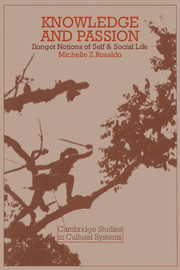Book contents
- Frontmatter
- Contents
- Preface
- Acknowledgments
- 1 The Ilongots
- 2 Knowledge, passion, and the heart
- 3 Knowledge, identity, and order in an egalitarian world
- 4 Horticulture, hunting, and the ‘height’ of men's hearts
- 5 Headhunting: a tale of ‘fathers,’ ‘brothers,’ and ‘sons’
- 6 Negotiating anger: oratory and the knowledge of adults
- 7 Conclusion: Self and social life
- Appendix 1 Ilongot phonology
- Appendix 2 Glossary
- Notes
- Bibliography
- Index
4 - Horticulture, hunting, and the ‘height’ of men's hearts
Published online by Cambridge University Press: 05 June 2012
- Frontmatter
- Contents
- Preface
- Acknowledgments
- 1 The Ilongots
- 2 Knowledge, passion, and the heart
- 3 Knowledge, identity, and order in an egalitarian world
- 4 Horticulture, hunting, and the ‘height’ of men's hearts
- 5 Headhunting: a tale of ‘fathers,’ ‘brothers,’ and ‘sons’
- 6 Negotiating anger: oratory and the knowledge of adults
- 7 Conclusion: Self and social life
- Appendix 1 Ilongot phonology
- Appendix 2 Glossary
- Notes
- Bibliography
- Index
Summary
Ilongots says that men's hearts are ‘higher’ then women's, meaning that men surpass women in liget and bēya, capacities that – as I have already suggested – provide much of life's challenge and sense. Because of certain characteristics of a young man's experience – his fearlessness and his propensity to movement, his skill, strength, and contact with peers – both ‘passion’ and ‘knowledge,’ energy and the mature sort of judgment that gives energy purpose and form, are apt to find their fullest expression in the lives not of women, but of men. To label men ‘angry’ may not, to our lights, be surprising. But when Ilongots say that men's hearts ‘exceed’ those of women, they are concerned not with “natural” dictate but with the social and moral ordering of a particular style of life.
Ilongot talk about the kinds of hearts and persons in their world appears, in short, to be concerned not simply with the ways that people are assumed to feel and think, but with how and why they organize their actions. And the Ilongot equation of desired strength and wisdom in men's hearts bespeaks not simply the experience of youths, but even more the organization of adult political life, and of productive roles and patterns of cooperation in Ilongot society at large. Having traced, at least in part, the bases of men's special claims in childhood development, I turn here to a consideration of the ways in which culturally organized differences between the sexes are made salient in the activities that constitute their daily lives.
- Type
- Chapter
- Information
- Knowledge and Passion , pp. 99 - 136Publisher: Cambridge University PressPrint publication year: 1980



